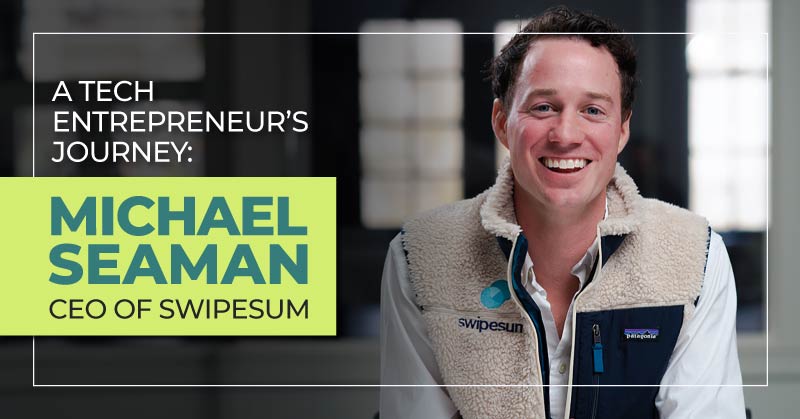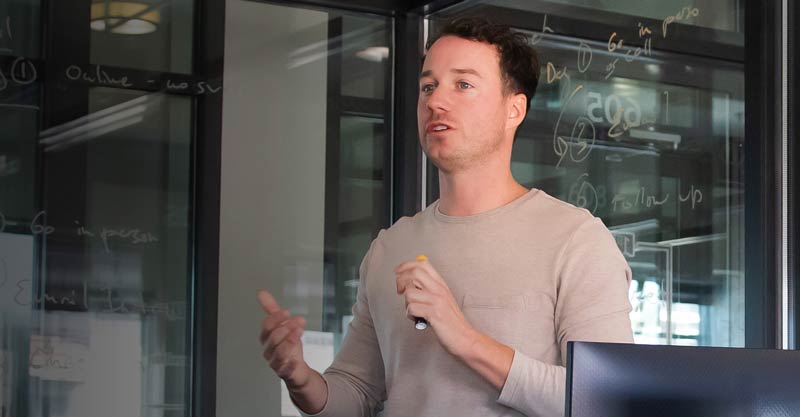
From Date Night Money to Disrupting the Payments Industry
A Tech Entrepreneur's Journey with Michael Seaman, CEO of Swipesum
February 8, 2024
We had the pleasure of interviewing Micheal about his feature in Entrepreneur Magazine,1 the early days of his big idea, and how he plans to support other tech founders across southern Missouri.
Codefi: Hey Michael! Congrats on the feature in Entrepreneur Magazine! How did it feel to dust off your entrepreneur origin story and reflect on how far you’ve come?
Michael Seaman: Every time I revisit the journey, it's filled with mixed emotions. It brought back those initial days of high energy and anxiety, where every challenge seemed like a mountain. But reflecting on these moments also highlighted the victories and the incredible growth since then. This reflection wasn't just about the hurdles, it was about celebrating the small and big wins that kept us going.
I thought about the importance of persistence and the incredible people who've joined me. It's far from a solo journey. I've been blessed with a team, some employed at Swipesum2 and some not, who shared the vision and helped navigate through the unknown. Their collective spirit, insights, and unwavering support have been the backbone of every success I’ve achieved. It was a reaffirmation of the power of teamwork and shared dreams in the entrepreneurial world.
With your Etsy business, your goal was to have some extra cash to enjoy life’s luxuries and go on dates. What goals informed your vision for Swipesum? How do you feel about the accomplishments you set out to achieve?
You know, the allure of date money is timeless – it's a goal that never fades! With Swipesum, my journey took a slightly different turn. Being in the industry, I noticed a glaring gap in customer experience and transparency. It struck me that there was a significant opportunity for improvement with a more innovative approach. Sure, the initial motivation was cash-driven – let's be real, who doesn't dream of creating generational wealth? But it was also about making a real difference in the industry.
What does success look like for you now?
Success, for me, is an ongoing journey with Swipesum. We've made significant strides, but I believe there's more to achieve before I can confidently call it a success. If I were to pinpoint one specific goal, it would be to return nine figures to our shareholders. That's the tangible, numeric target I'm aiming for.
As someone who successfully navigated the transition from a side hustle to a full-time commitment with your tech business, what insights can you share into the shift in mentality required? How did your approach, decision-making, and overall mindset evolve as you made the leap from balancing your business alongside other commitments to fully dedicating yourself to its growth and success?
The journey from a side hustle to a full-time commitment with Swipesum was a real learning curve. Initially, all of us founders were focused on our corporate jobs and we had this idea we were working on. One of the first eye-openers was discovering the startup community, which I hadn't known about before. I quickly learned that I was expected to have a pitch deck, a clear vision of your business's future, and an understanding of the capital needed to get there.
Creating that first pitch deck was a pivotal moment. It forced us to deeply consider and articulate our goals and strategies, fostering numerous discussions and a lot of soul-searching. The unexpected consequence was financial backing from family, friends, and fools, who invested a few hundred thousand dollars. With their faith in us came a heightened sense of responsibility. After accepting those first checks I couldn’t fail, and that realization was the catalyst for a major shift in mindset. It wasn't a side project anymore, we all quit our jobs and went all in.

You mention growing up in a creative and entrepreneurial household, where it seems like self-confidence naturally manifested within you as an entrepreneur. Is this true? What can you share about any doubts or limitations you experienced as you progressed along your entrepreneurial journey?
Growing up in a household where both parents were self-employed definitely played a significant role in shaping my entrepreneurial spirit. But, a startup comes with its own set of doubts and limitations, mainly stemming from inexperience.
For me, the key to overcoming these challenges lies in the ability to seek out and learn from others who have the experience you lack. I'm naturally outgoing, which has been a huge advantage when seeking out knowledge. This process of learning from others' expertise has reduced uncertainties, helping the stress to go away!
Coming from the west coast, what are some of the underestimated benefits of founding a company in southern Missouri?
Moving to southern Missouri has turned out to be a great decision, and I'm here with no plans of leaving anytime soon. One of the most striking benefits here is the ease of connecting with other CEOs and business owners. There's a strong, supportive network willing to walk you in the door.
Additionally, there's a discerning approach toward tech startups in the Midwest. Investors and the business community here tend to focus on backing real, profit-generating companies. This environment encourages founders to prioritize sustainability and profitability from the outset. It's an approach that ensures if a concept isn’t viable, it becomes apparent quickly.
How has the local or regional ecosystem changed since you’ve been in Missouri, and what could be done to improve the ecosystem from your perspective? What are we missing?
Since I've been in Missouri, the startup ecosystem has definitely evolved and grown. There's a noticeable increase in involvement and engagement. We're seeing more funds and angel investors getting involved and reaping the rewards of successful exits. Additionally, new programs have been introduced to fill gaps that were previously evident.
While my focus hasn't been Missouri as a whole, it's clear that the region is moving in the right direction.
In Bounce My Big Idea, we help tech entrepreneurs determine if their idea is desirable, viable, and feasible. How did you go about determining the potential of your business idea in the early stages of your concept? And did your initial idea change into anything different than you expected as you worked on it?
It's fantastic that a platform like Bounce My Big Idea exists, especially as one of many programs that can take it from idea to IPO. In the early stages of Swipesum, the key to determining our idea's potential was extensive research and customer discovery. Many first-time entrepreneurs skip it. By doing the research and more customer discovery than might seem necessary at first, you can get a real sense of what you’re working with.
Yes, our initial idea at Swipesum did evolve. We thought we could fully automate and do everything online, but we soon realized that for our ideal clients, a more white-glove approach was necessary. Customers needed to evaluate both the people behind the technology and the technology itself to see if a partnership made sense. This led to several process changes and multiple rebrands. Today, we're confident that the direction we've taken is the right one.
In our 120-Day Tech Startup program, we help aspiring founders do deep dives on problem discovery to understand what drives customers to switch from their existing solutions to improve problem-solution fit and accelerate traction. In your industry, there is a lot of inertia in existing solutions and hesitance to switch payment providers - how did you zero in on what would cause customers to switch? What advice do you have for founders eager to rush and build an MVP before they really know switching triggers?
In the payments industry, despite the abundance of options – over 5,000 companies registered in the U.S. alone – changing providers is often seen as a daunting task and so those solutions are sticky! Through initial sales efforts we realized that to persuade merchants to switch, we needed a thorough analysis of their processing statements, which traditionally took 3-14 days.
Identifying this bottleneck, which the whole industry had, led us to develop our own solution. We created Staitment,3 a software that harnesses OCR and AI to audit processing data in seconds rather than days. This innovation became our moat in a crowded market.
For founders eager to jump into building an MVP, my advice is to draw insights from experiences like ours and programs like the 120-Day Startup. Understand the industry's pain points deeply and use them to your advantage.
Knowing what you know now, would you do anything differently with Swipesum from conception to where you are today?
Definitely, there are countless things I would do differently. However, the learning journey with Swipesum has been so invaluable that I wouldn't trade it or wish to change any part of it. In the future without a doubt, I will do it again. Next time I will be armed with the knowledge and won't repeat the same mistakes.
As an Entrepreneur in Residence with Codefi, what excites you most about where the region is headed with tech entrepreneurship?
What really energizes me in my role is the opportunity to engage directly with startups, mentors, corporates, and the broader community involved in tech entrepreneurship. Being able to witness and contribute to other entrepreneurs' journeys is incredibly rewarding.
There's a noticeable growth in the number of real businesses emerging from initial startup ideas, alongside a surge in new ideas. What we are working on now will really change the Southern Missouri my three kids will grow up in. That is fulfilling work for me.
What are you most looking forward to this year in your business and as an Entrepreneur in Residence for Codefi?
This year will be an exciting one for Swipesum, as we have major product releases lined up, in collaboration with the biggest name in payments. Stay tuned!
In my EIR role, I know the upcoming milestones for the startups in our programs. Knowing their potential developments and breakthroughs, I'm eagerly optimistic to see how they unfold.
What’s your advice for someone who has a tech idea or is working on a tech application already?
Straightforward advice: Do it, but be smart. Leverage the experiences and resources provided by those who have done it before.
Do you have a tech idea?
There's still time to start your tech entrepreneurial journey off right! Apply for Bounce My Big Idea,4 a 4-week, cohort based, online workshop to help you test the potential of your tech idea and set you on the path to success as a tech entrepreneur. Learn more and apply: